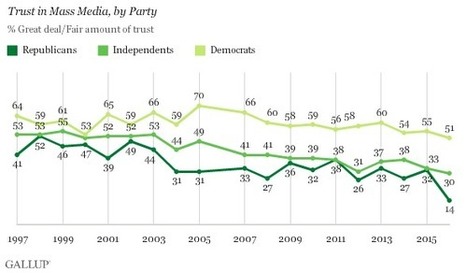The press will destroy Trump and Trump will destroy the press.
Consider that trust in media began falling in the ’70s, coincident with what we believe was our zenith: Watergate. We brought down a President. A Republican President.
Now the press is the nation’s last, best hope to bring down a compromised, corrupt, bigoted, narcissistic, likely insane, incompetent, and possibly dangerous President. A Republican President. Donald Trump.
If the press does what Congress is so far unwilling to do — investigate him — then these two Republican presidencies will bookend the beginning of the end and the end of the end of American mass media. Any last, small hope that anyone on the right would ever again trust, listen to, and be informed by the press will disappear. It doesn’t matter if we are correct or righteous. We won’t be heard. Mass media dies, as does the notion of the mass....



 Your new post is loading...
Your new post is loading...










Jeff Jarvis writes a powerful post about the death spiral of Trump and the media.